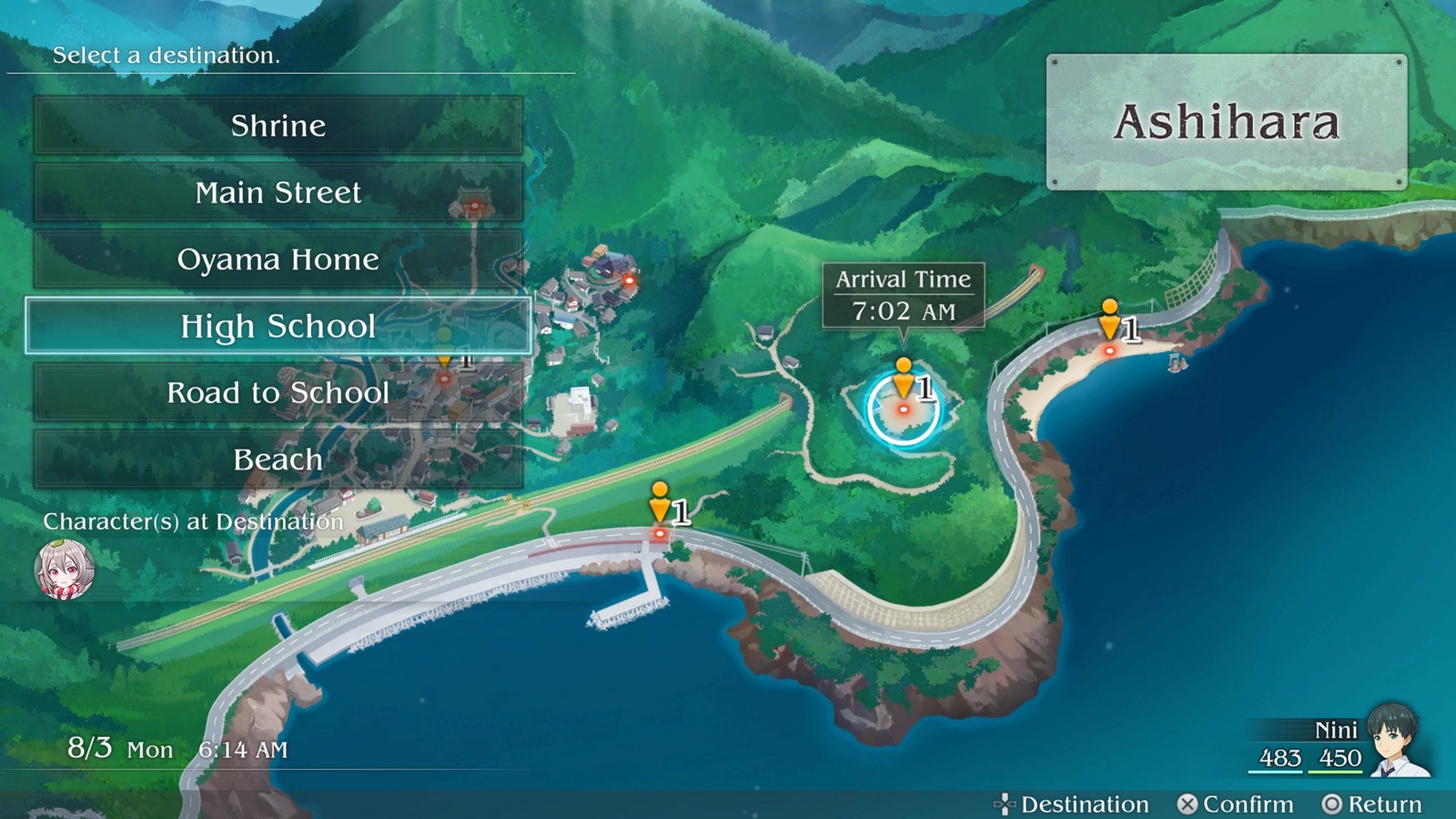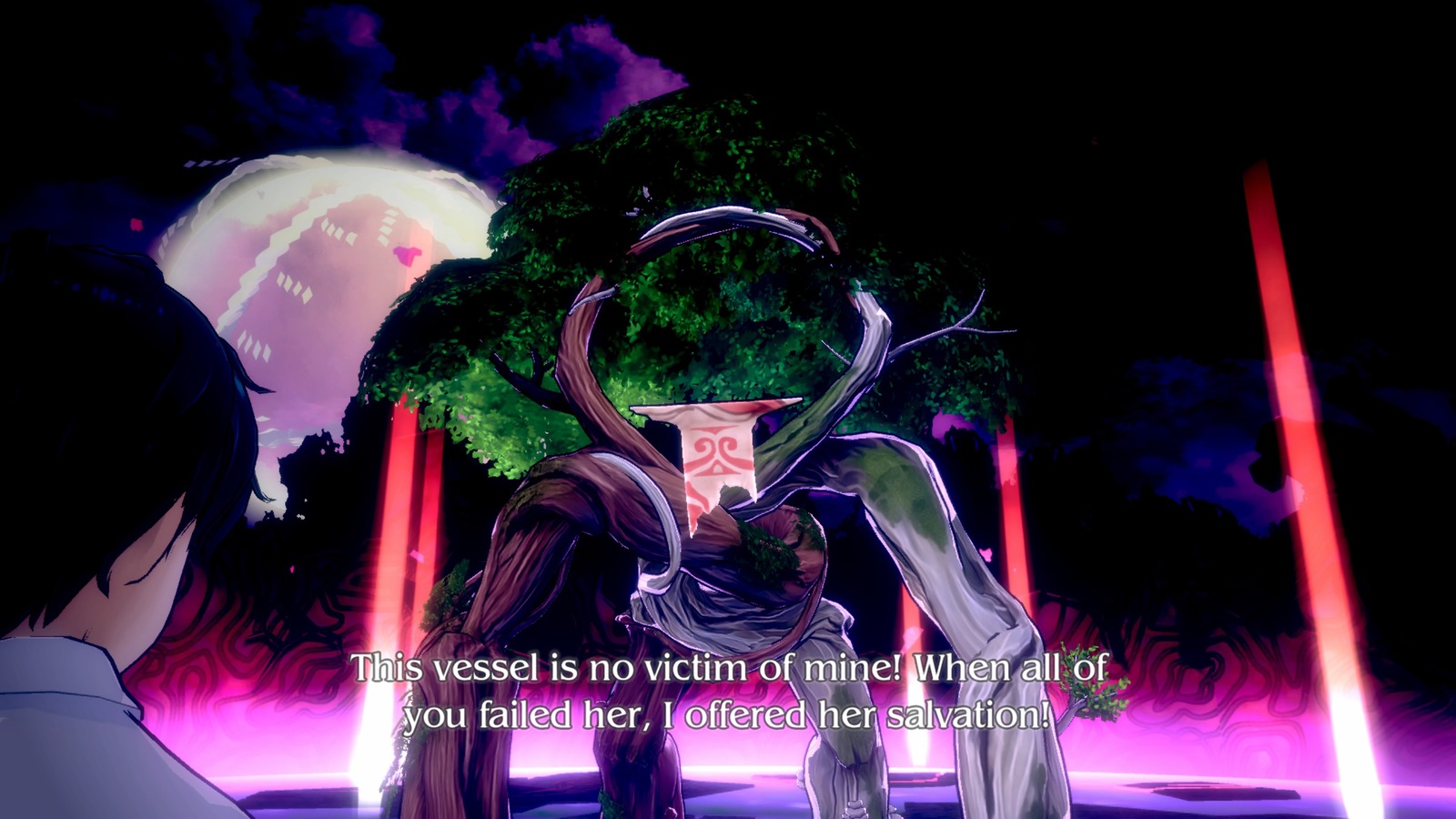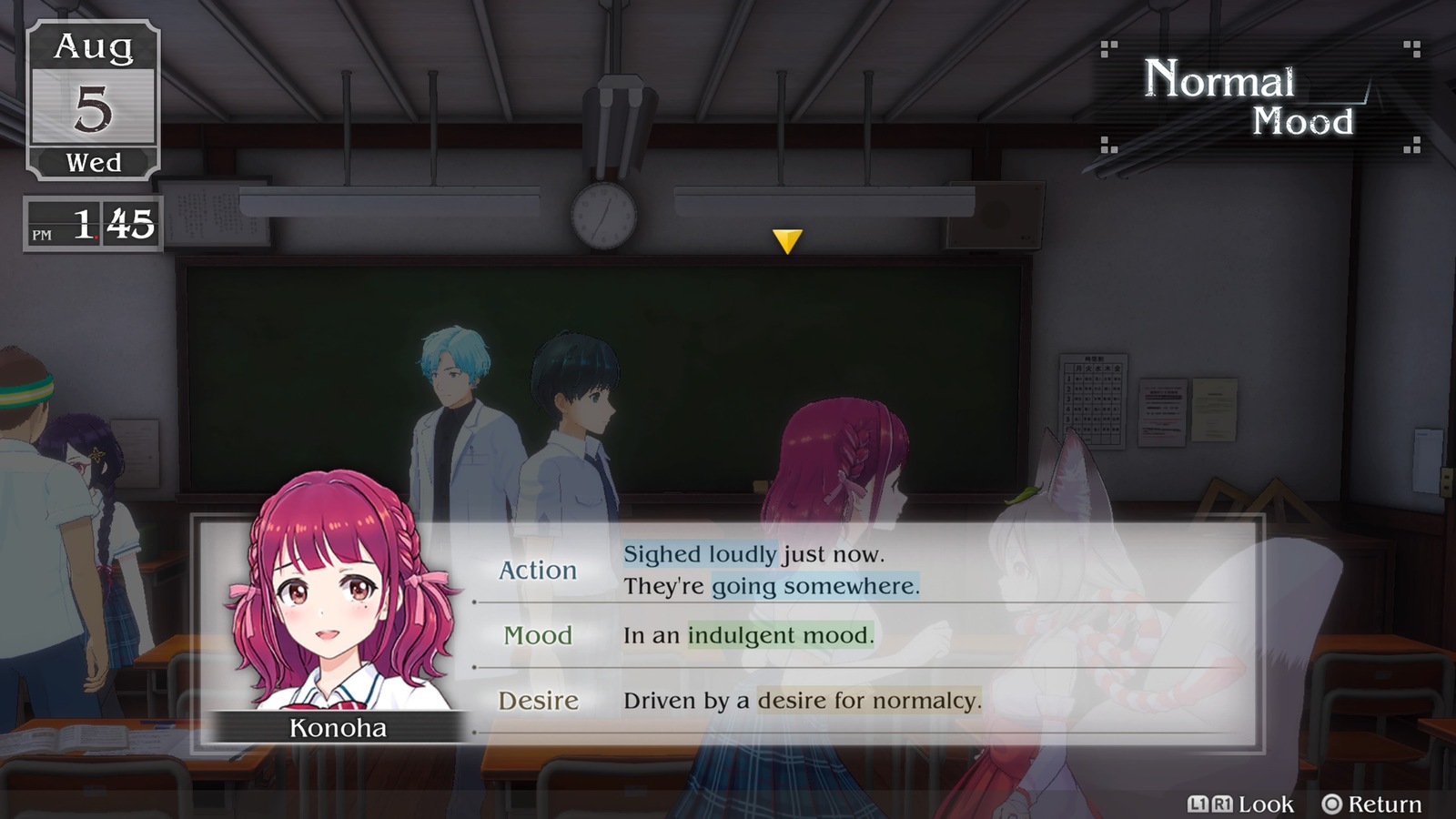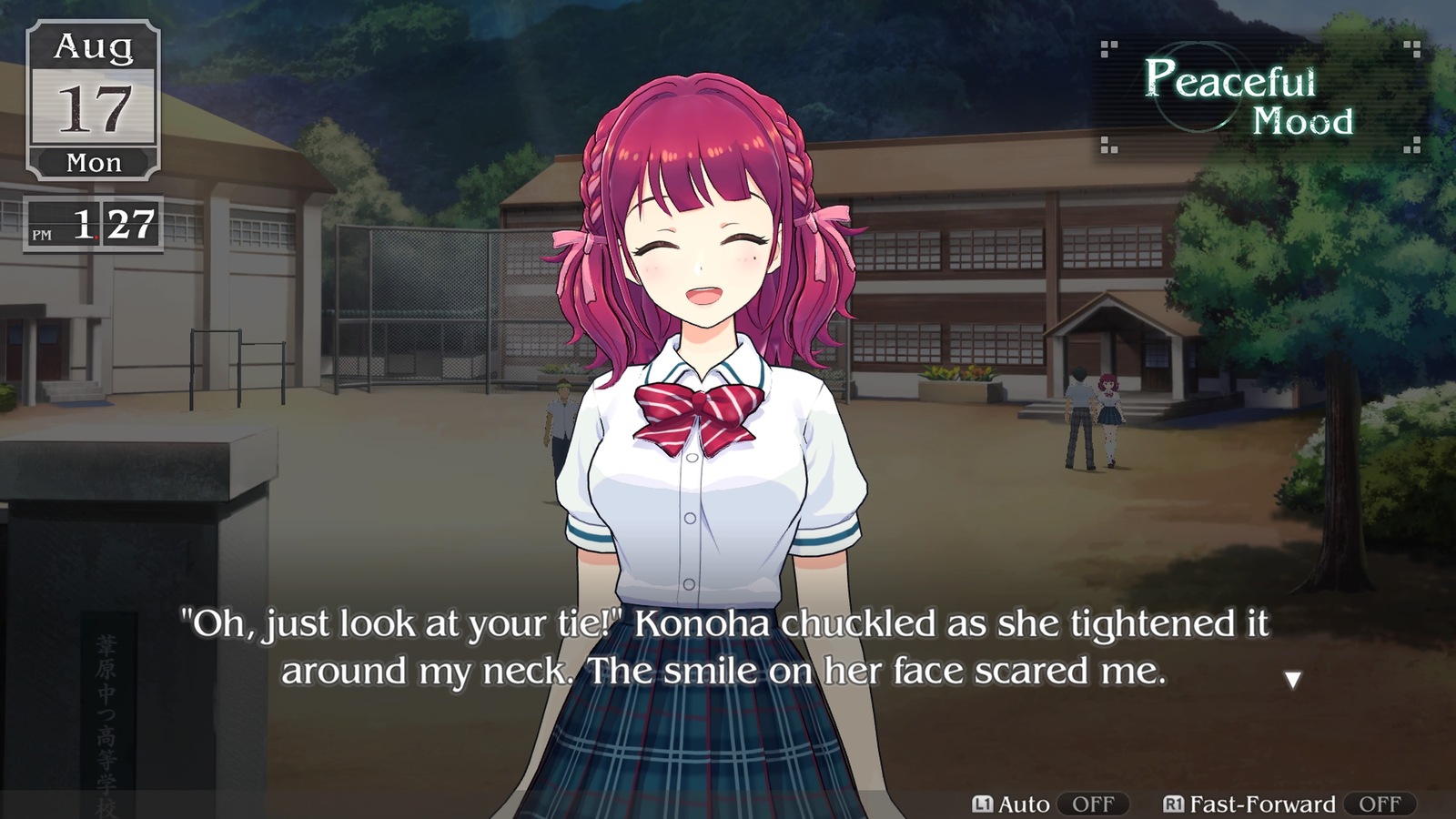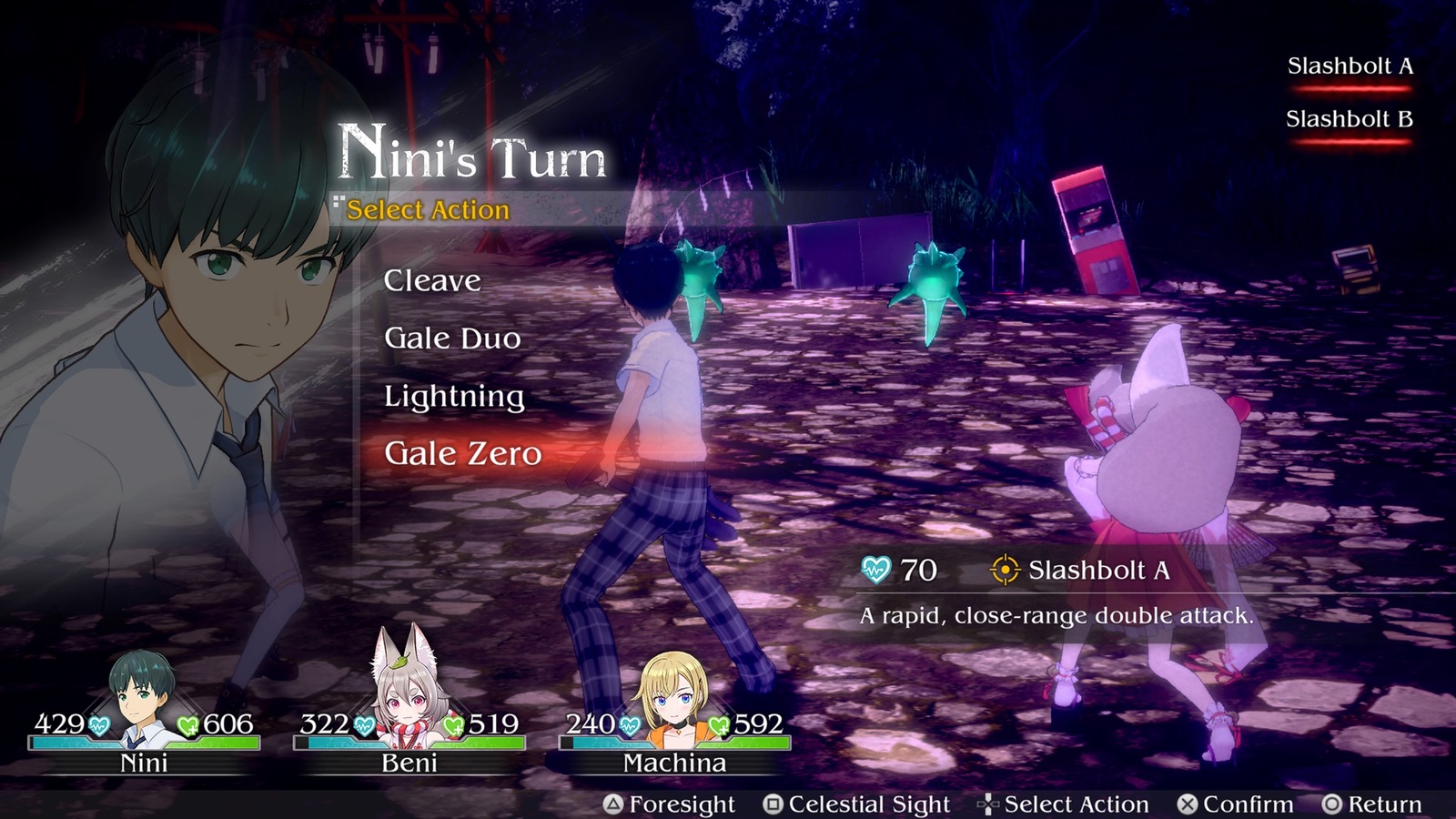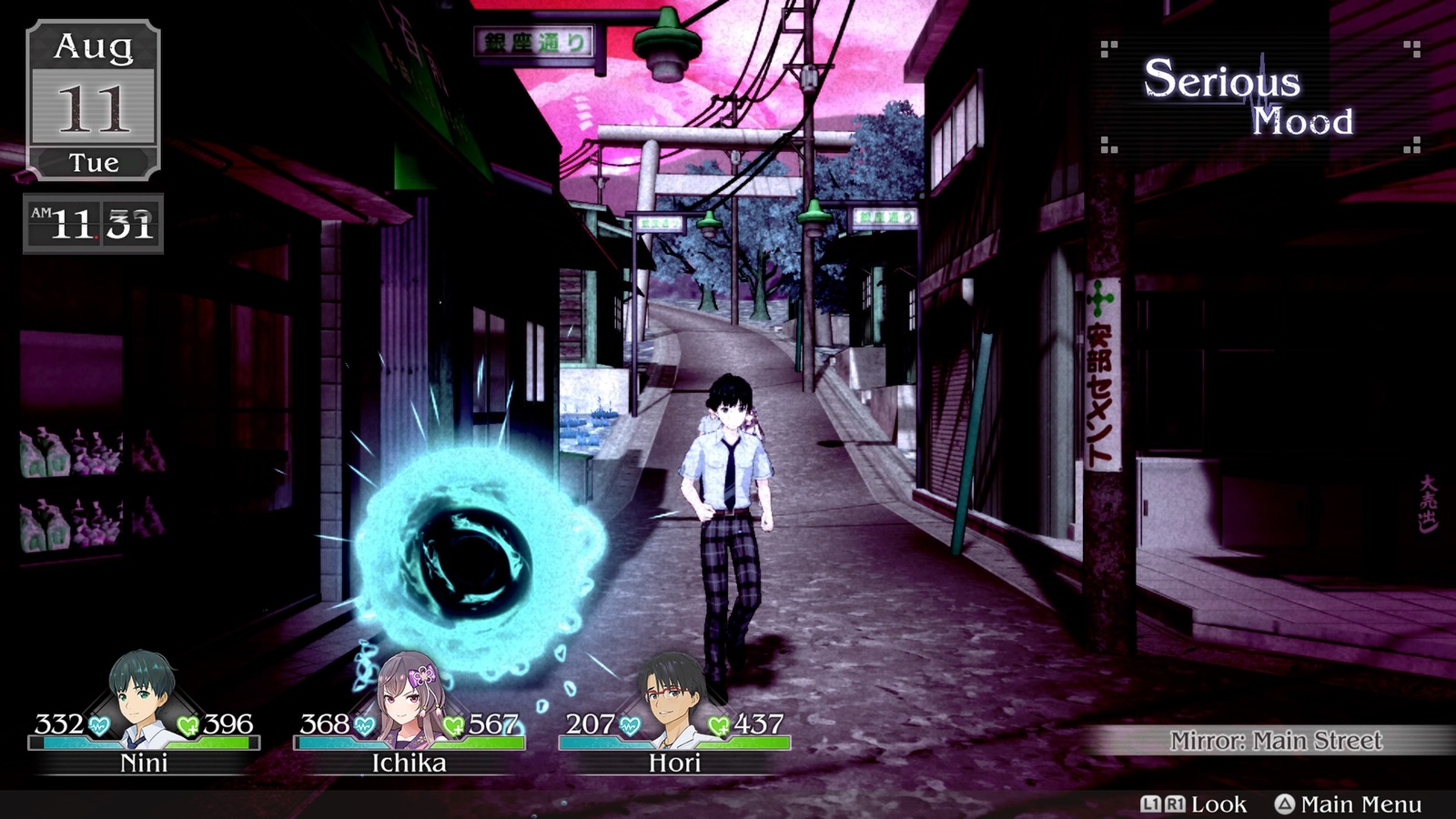Loop8: Summer of Gods gives you a lot to think about. The game plops you into a town full of people and you primarily focus on building up your relationships with them. Layered on top of that premise lies a time management system, where every action you take moves time forward until you reach the end of the month. Further still, monsters gradually invade the town and possess your potential friends. In order to combat these creatures, you need to hone the skills of yourself and others and then take the (turn-based) fight to them. All of these various subsystems swim in and out of your mind as you play, but throughout it all, I couldn’t help but think of one thing in particular: fish.
Specifically, I thought about fish living in an aquarium. Aquariums simulate the lives that fish may lead in the outside world. Groups of fish congregate and socialize around landmarks like caves, rocks, or castles while doing their fishy activities. They swim, they eat, they love, they laugh, and they cry in the most approximate ways that fish can manage. In a way, then, observing a fish aquarium is like observing an abstracted version of our own lives.
Now, I am not a fish, at least as far as you know, which makes it difficult to say just how close the resemblance is. When fish meet at a big rock, are they communicating or minding their own business? Are these fish friends or enemies? Without being able to put ourselves in the fins of fish, we can only project our own human understanding on the details. That lack of details adds a tinge of artificiality to our perspective, which turns this little fish society into a shallow recreation of our human lives at best.
Loop8 resembles a playable version of observing fish in an aquarium. The game takes place in a small Japanese town with various “landmark” areas. Your fellow citizens congregate at places like school, the beach, or the shrine. Much like fish, you can rarely tell what they’re doing at any given time other than existing. Luckily, that leaves them open for buffing up your stats with them. You primarily accomplish this by striking up a conversation with someone making a “suggestion.”
Every person will react to your suggestions based on a variety of factors. Everyone has a mood, persona, and desire that seemingly shifts at random. This means that on paper you may want to pay attention to these factors (you can use a power called “Demon Sight” to suss out what may be effective) before making suggestions. In practice, there are three suggestions that work nearly every time regardless of any of that stuff and you have little reason to deviate from them. I suspect that the purpose of the randomized conversation factors was to inject some life into the social mechanics. Once you figure out what the most effective options are, however, they accomplish the exact opposite.
The limits of the suggestion system hinder your ability to connect with anyone around you. Suggestions don’t directly lead to getting to know a character better. Instead they simply buff stats into one of three categories: friendship, affection, or hate. Once you hit certain thresholds for these stats, your target will then spit out a new conversation. Basically, you must keep spamming the same suggestions over and over until you see something new. If bulldozing each character with the easiest suggestions weren’t artificial enough, the constant need to repeat the process drains the characters of any life to be found.
That’s a shame, because these characters do have life buried beneath the awkward subsystems. Everyone in the game hides secrets and personality quirks that gradually reveal themselves over the course of your button mashing to raise up their stats. They don’t all share equally compelling stories, but most at least have some endearing oddities that make an impression. If Loop8 followed a more traditional story structure, I could see these characters contributing towards a pretty memorable narrative.
However, Loop8 does not follow much of a story structure at all. An overarching story about the invading monsters exists, yet its events and anything mandatory to completing them keeps the details incredibly sparse. Basically, monsters called Kegai sneak into the town one by one every few days. They’ll possess one of your friends, and if you don’t identify who got possessed and stop them in time, the game will end prematurely. You gain little insight into the nature of the Kegai or even the characters (at least anything that won’t be obvious by talking to them) through these battles. Chatting up the townspeople provides the vast majority of the exposition about what’s going on with the world around you.
While the premise of sniffing out your possessed friends is compelling, the disjointed nature of the storytelling curbs the impact of these and other reveals. On more than one occasion, I found myself speaking to someone only to accidentally find out that they were this round’s monster of the week. Sometimes it will be someone you know moderately well, at others it will be someone I completely missed speaking to. This of course dramatically changes how much emotional weight a boss battle with them can have, assuming that you’ve formed much emotional attachment to the people that you have spoken to in the first place.
Similarly, other reveals suffer from the lack of focus given to them. For example, one of the characters looks like a teenage girl but is actually a robot. In a normal game, that might be something that gets revealed to you down the line in some kind of twist. In this game, she more or less says she’s a robot from the get-go. You may initially believe otherwise, like she’s just pretending to be a robot as part of some endearing character quirk or speech pattern – after all, it would be weird for her to just be a robot with no real explanation or gravitas given to that reveal. That assumption quickly shatters when you bring her into battle and she starts frying monsters with laser beams.
As is, the premise feels off. It would be one thing if robots were treated as some commonplace thing in the world of the game. That’s not the case. It would be an even better thing if one of your classmates, any of them really, at least gave some acknowledgement that she is a robot and that this is an unusual concept in some way. Instead, the game treats this as some kind of non-secretive secret; something that would surprise you to know yet has zero bearing on the story or your relationships at all.
Nearly every character hides some odd reveal like this and it is always communicated in a muted, uneventful way. I genuinely can’t tell sometimes whether this boils down to Loop8 having a strange attitude to its writing or, what I would guess as more likely, the writing simply being compromised by the scope of the game.
The way Loop8 structures itself forces most of the nuance of the characters into the background. These details can’t be natural parts of the story because the developers can’t force you to progress specific characters as part of the plot. Unfortunately, there also isn’t enough focus put into intercharacter relationships for these reveals to have any impact on others. Everything important to defining who these characters are must fit into the tiny box of one-on-one, mostly optional conversations with you and you alone. Perhaps a version of Loop8 without these harsh restrictions was once in the cards. Unfortunately, the version that exists now is decidedly compromised.
Perhaps the most notable place compromise can be felt is in how the relationship stats coexist. Most of your suggestions will buff your friendship and affection stats simultaneously. This often means that in an effort to befriend someone, you will unintentionally also start dating them or otherwise be forced to hear about how attractive they find you. More egregiously, this means that a character can say something like “I love you so much, I’m so glad we are dating!” one second, and then the very next time you speak with them they’ll say something like “Oh, I could never see you as my boyfriend.” Talk about whiplash!
Moments like these demonstrate just how artificial Loop8 is as a simulation of life. Talking to people, making suggestions to them, meeting them at your landmark of choice…these all technically resemble ordinary human life. However, it quickly becomes apparent that you are not interacting with people here. You interact with fish. You live in an aquarium. Loop8 conveys a shallow recreation of life at best.
That’s a problem, because that’s more or less the game. While you do also fight monsters, that makes up a relatively small portion of Loop8. It also similarly lacks nuance in many of the same ways that the relationship mechanics do.
Battles include some interesting ideas yet fail to commit to their importance. Each turn, you pick to either attack the enemies or provide some kind of buff to your party members. Your party members themselves act on their own. Similar to the social mechanics, however, you can use your “Demon Sight” ability to predict what both your friends and your opponents can do. This allows for a system where you can shift your strategy to best suit what the AI cooks up rather than be the sole driving force.
Unfortunately, taking the information you glean from Demon Sight and turning it into actual useful information requires a learning period. Demon Sight doesn’t tell you exactly what each combatant will do. It merely drops some vague hints about it that you can only really understand after fighting a few rounds. By the time you wrap your head around the tactics, most fights are likely to be over. That speaks to the real issue: some room for strategy exists here, you just don’t need the extra space at all.
More than tests of strategy, these fights act as stat checks. If you mix in some training of your own stats in between bouts of raising up your friends’, you’ll have little to no issues clearing the combat sections. Simply spamming your strongest attacks beats out more clever strategies. The only fight I had trouble with in the entire game was the final one, and I cleared it simply by swapping out one of my party members for one that would be more likely to buff my attacks. That way, I could maintain my “strategy” and out-damage the boss. The combat sadly ends up being about as shallow as the rest of the experience.
That’s Loop8 in a nutshell. I sure hope that I didn’t forget anything. Probably not. See you later!
Well, I just looped around and started the review over from scratch. This time, I realized that you probably want to know why it’s called “Loop8.” On top of all of that other stuff I talked about, Loop8 also contains a looping mechanic.
While Loop8 revolves around increasing stats, you are theoretically unlikely to max them all out on your very first run through the game. This is especially important when it comes to the bosses, as if you don’t boost your stats with the possessed character high enough, you won’t be able to save their life. Your day-to-day activities run on a timer, so things like moving, talking, or grinding up your stats will all eat out chunks of your time. Moving will especially do some damage.
Not to go on too much of a tangent here, but the protagonist in this game walks incredibly slowly. He not only moves slowly in a literal, observable way, he also moves slowly in an in-universe way. When you take a single step, a minute passes in-game. This means that he can spend anywhere from 30 to 40 minutes crossing a single street. I guess his backstory is that he moved to Japan from space (don’t think about this too much, no one else in the game does) so maybe the idea is that he walks like he’s in space everywhere he goes.
My point is that you don’t have a whole lot of time, so the game encourages you to start it over by looping. You don’t carry over your stats by looping. Instead, you carry over two things: “blessings,” which are basically collectibles that give permanent buffs to stats, as well as your “memory” of where your stats were at. The latter translates to your stats increasing back to where they were at a far more rapid rate than they originally did.
While convenient, looping ends up being a huge pain anyway. This system admittedly decreases the amount of times you need to suggest activities to people. However, you essentially trade out that tedium for the tedium of needing to mash through tons of dialogue that you’ve read before. I get it on one level – that stuff makes up the vast majority of the game. If you were to excise all of that dialogue, there would be nothing left. On the other hand, there had to be a more graceful way to accommodate replays than this. If one run of the game didn’t grind down your view of the characters into pure artificial numbers, a loop will almost certainly finish the job.
Perhaps the most notable thing about the looping mechanic is that it hardly feels necessary. I died to the first boss on my initial loop. On the second loop, I played through the game entirely and managed to reach the end with a single casualty. I tried one more time on a third loop, where I easily maxed out everyone’s stats with zero deaths, resulting in the best ending of the game. I got the sense that if I had tried just a little harder, I could have easily reached the true conclusion without looping at all.
The looping, like so much of Loop8, feels underdeveloped. I won’t deny that some fun can be had in experiencing Loop8’s many quirks. If anything, it can at least fall back on the simple fun of maxing out numbers. The overall experience fails to come together as well as it was likely intended to. Although a fascinating ambition lurks beneath the depths of Loop8, what we ended up with was a modest aquarium of potential rather than a vast ocean.

